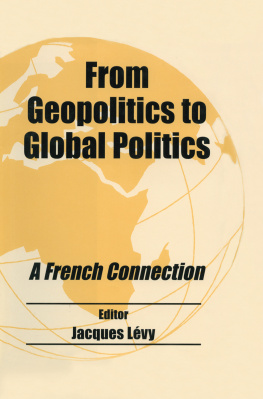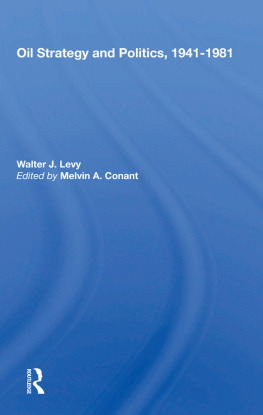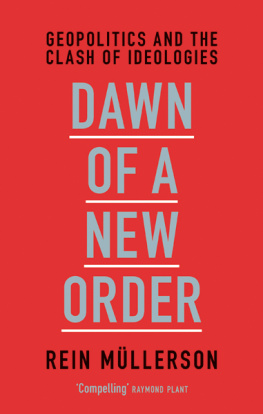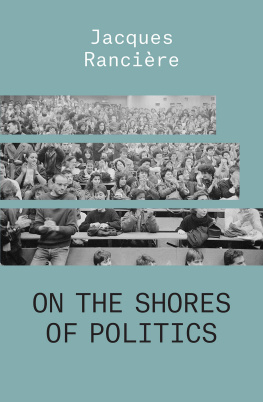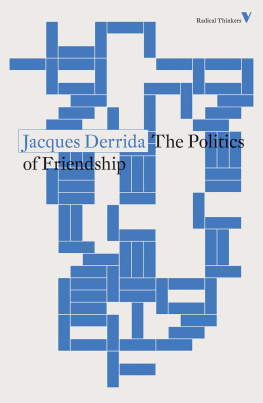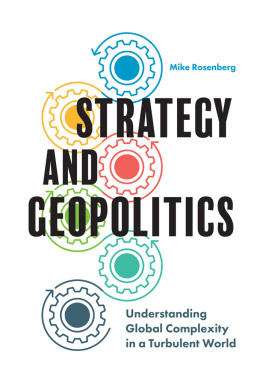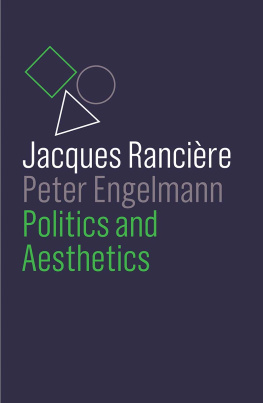Jacques Lévy - From Geopolitics to Global Politics: A French Connection
Here you can read online Jacques Lévy - From Geopolitics to Global Politics: A French Connection full text of the book (entire story) in english for free. Download pdf and epub, get meaning, cover and reviews about this ebook. year: 2001, publisher: Routledge, genre: Politics. Description of the work, (preface) as well as reviews are available. Best literature library LitArk.com created for fans of good reading and offers a wide selection of genres:
Romance novel
Science fiction
Adventure
Detective
Science
History
Home and family
Prose
Art
Politics
Computer
Non-fiction
Religion
Business
Children
Humor
Choose a favorite category and find really read worthwhile books. Enjoy immersion in the world of imagination, feel the emotions of the characters or learn something new for yourself, make an fascinating discovery.
- Book:From Geopolitics to Global Politics: A French Connection
- Author:
- Publisher:Routledge
- Genre:
- Year:2001
- Rating:5 / 5
- Favourites:Add to favourites
- Your mark:
- 100
- 1
- 2
- 3
- 4
- 5
From Geopolitics to Global Politics: A French Connection: summary, description and annotation
We offer to read an annotation, description, summary or preface (depends on what the author of the book "From Geopolitics to Global Politics: A French Connection" wrote himself). If you haven't found the necessary information about the book — write in the comments, we will try to find it.
Jacques Lévy: author's other books
Who wrote From Geopolitics to Global Politics: A French Connection? Find out the surname, the name of the author of the book and a list of all author's works by series.
From Geopolitics to Global Politics: A French Connection — read online for free the complete book (whole text) full work
Below is the text of the book, divided by pages. System saving the place of the last page read, allows you to conveniently read the book "From Geopolitics to Global Politics: A French Connection" online for free, without having to search again every time where you left off. Put a bookmark, and you can go to the page where you finished reading at any time.
Font size:
Interval:
Bookmark:
Nurit Kliot, Haifa University, Israel, and
David Newman, Ben Gurion University of the Negev (eds.)
David Newman, Ben Gurion University of the Negev (ed.)
Colin S. Gray, University of Hull, and
Geoffrey Sloan, Britannia Royal Naval College, Dartmouth (eds.)
Foreign Affairs, National Security and Property Rights
Geoff Demarest, United States Army
Dick Hodder, Sarah J. Lloyd and Keith McLachlan,
School of Oriental and African Studies, London (eds.)

FRANK CASS PUBLISHERS
711 Third Avenue, New York, NY 10017
1. Geopolitics 2. World politics 1989 3. Security, International I. Lvy, Jacques
327
ISBN 0 7146 8145 8 (paper)
From Geopolitics to Global Politics: A French Connection of Geopolitics (ISSN 1465-0045)
52 (Autumn 2000)
published by Frank Cass.
a retrieval system, or transmitted, in any form, or by any means, electronic, mechanical,
photocopying, recording, or otherwise, without the prior written permission of
the publisher of this book.
Font size:
Interval:
Bookmark:
Similar books «From Geopolitics to Global Politics: A French Connection»
Look at similar books to From Geopolitics to Global Politics: A French Connection. We have selected literature similar in name and meaning in the hope of providing readers with more options to find new, interesting, not yet read works.
Discussion, reviews of the book From Geopolitics to Global Politics: A French Connection and just readers' own opinions. Leave your comments, write what you think about the work, its meaning or the main characters. Specify what exactly you liked and what you didn't like, and why you think so.

